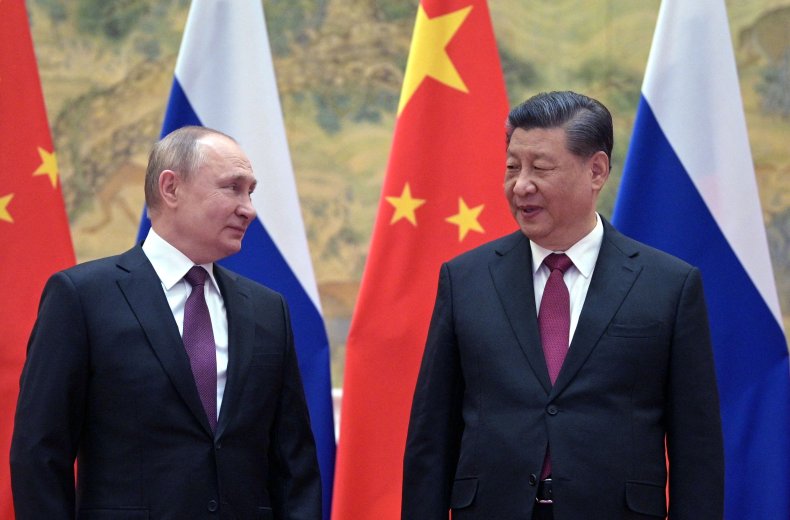JOHN FENG
President Xi Jinping of China and his Russian counterpart, Vladimir Putin, renewed support for each other's core interests in a telephone conversation on Wednesday as the war in Ukraine entered its 16th week.
"China stands ready to promote the stable and long-term development of pragmatic bilateral cooperation with Russia," Xi told Putin, according to a Chinese Foreign Ministry readout.
"China stands ready to continue mutual support with Russia on issues concerning core interests and major concerns, such as sovereignty and security, and to deepen strategic coordination between the two countries," he said.
In return, Putin threw his weight behind Xi's "global security initiative" and backed Beijing's opposition to interference on "domestic affairs," among them Xinjiang, Hong Kong and Taiwan, the Chinese-language press release said. The comments built on glowing remarks by Russia's foreign minister, Sergey Lavrov, earlier this month.
 President Vladimir Putin of Russia, left, and President Xi Jinping of China pose for a photograph during their meeting in Beijing on February 4, 2022. Putin and Xi pledged support for each other’s core interests in a phone call on June 15, according to a readout published by the Chinese Foreign Ministry.ALEXEI DRUZHININ/SPUTNIK/AFP VIA GETTY IMAGES
President Vladimir Putin of Russia, left, and President Xi Jinping of China pose for a photograph during their meeting in Beijing on February 4, 2022. Putin and Xi pledged support for each other’s core interests in a phone call on June 15, according to a readout published by the Chinese Foreign Ministry.ALEXEI DRUZHININ/SPUTNIK/AFP VIA GETTY IMAGESIn a paragraph about Ukraine, Xi told the Russian leader: "China has always made independent judgements based on the historical context and merits of the Ukraine issue." China has sought to promote world peace and the stability of the global economic order, Xi said.
"All parties should seek a proper resolution to the Ukraine crisis in a responsible manner. China will continue to play a constructive role in this regard," Xi said without elaborating. His comments on the Ukraine war were omitted from an initial English-language readout on the Chinese Foreign Ministry's website, but later added to the statement.
It was their second publicized talks since the invasion of Ukraine began 112 days ago. The Chinese leader is yet to call President Volodymyr Zelensky of Ukraine, despite Kyiv's positive signals about such a move.
Beijing may have little room to adjust its strategic alignment with Moscow, but Chinese officials openly argue they are on the right side of history. They've been critical of the Western military aid flowing into Ukraine, which they see as deliberately prolonging the conflict.
The Kremlin has reason to appreciate Beijing's support, which is reflective of China's public sentiment at a time of intense rivalry with the West in general and the United States in particular. Senior Russian and Chinese officials have maintained close contact since the outbreak of war in Europe.
Lavrov was on the phone with Chinese Foreign Minister Wang Yi in the hours after Putin launched his "special military operation" into Ukraine on February 24. The following day, the Russian president declared his objective to "prevent genocide" in the Donbas in a call with his Chinese opposite number.
"Xi Jinping emphasized his respect for the actions taken by the Russian leader during the current crisis," the Russian Embassy in China said in a readout published three days later, on February 28.
To be sure, China's major trading partners in the West have been alarmed by Beijing's refusal to condemn Moscow or even use the word "invasion" to describe recent events, decisions they see as providing significant political cover for Russia's actions, despite Beijing's insistence that it won't help sustain Putin's war in any material way.
In an important year for Xi himself, in which major policy documents have repeatedly stressed the word "stability," the leadership in Zhongnanhai faces a sea change in the West's assessment of China as a long-term partner.
As proof of their latest anxieties, officials in Washington and Brussels regularly point to a 5,000-word joint statement Xi and Putin issued from Beijing on February 4, in which they declared the China-Russia partnership had "no limits" and "no forbidden areas" of cooperation.
No comments:
Post a Comment